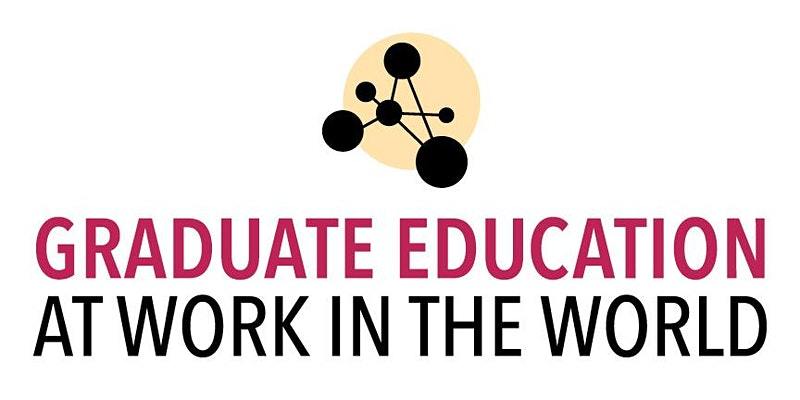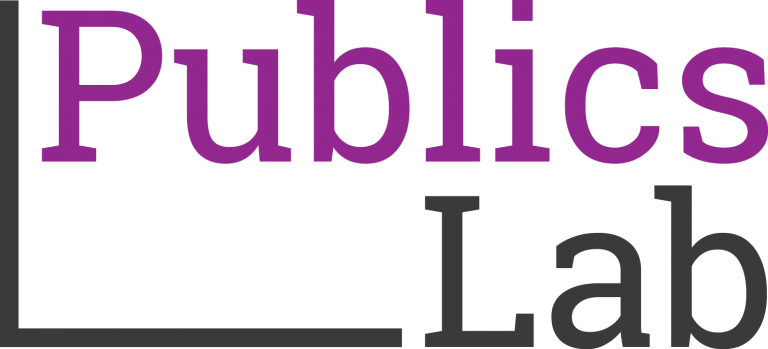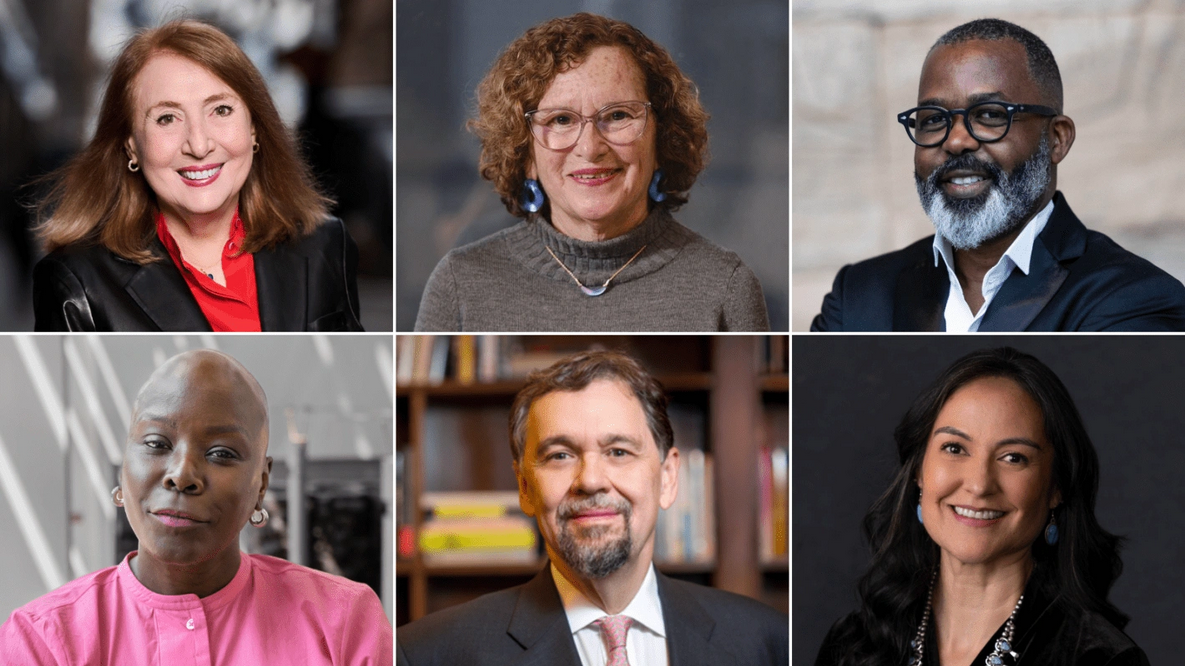Graduate Education at Work in the World
Thu, Feb 18, 2021
12:00 PM–5:30 PM
This event will take place online via Zoom. Please register below.

Join the Futures Initiative and PublicsLab in collaboration with The James Gallery and The Center for the Humanities of The Graduate Center, CUNY for a free two-day conference and workshop: Graduate Education at Work in the World. The conference will bring together practitioners, students, faculty, and administrators to collectively imagine and redesign graduate education to support students, scholarship, and the public good.
Due to the COVID-19 pandemic, this conference will now take place VIRTUALLY on February 18-19, 2021. All are welcome! Registration is now open!
This conference will focus on new approaches to graduate education in support of the public good, without losing sight of other key elements of higher education reform—including labor practices, student debt, efforts toward improving diversity and inclusion, shared governance, pedagogical training, and more. Participants will generate ideas, share best practices, consider difficult questions, and work toward new models for graduate education that support an array of creative, flexible career paths.
Our premise is that graduate education can lead to engaging and often unexpected opportunities—but this should not be left entirely to chance and the initiative of individual students. Moreover, deep connections between scholars and society can be mutually beneficial, as scholars have much to learn from communities of practice and other knowledge sources while contributing their own expertise. However, for these relationships to grow and thrive, graduate education must shift from a reproductive model to a generative one. We ask: How can our institutions reshape graduate education to support different futures? How, in so doing, may we also serve multiple publics and communities and engage in the most pressing problems of our time?
We will be asking how, in any field, one learns to translate specialized skills and knowledge for different audiences—a skill vital to academe and beyond. How can scholarly research have an impact within the communities students care about? What forms of material and intellectual resources, institutional requirements, thoughtful mentorship, flexible curricular design, and co-curricular experiences help to shape future lives, at work and in communities? Together, we hope to envision and champion an academy that supports multiple futures and contributes to the development of meaningful relationships between scholars and society.
Themes of the conference include:
- Public-oriented and digital teaching and research examples
- Scholarship and pedagogy grounded in creative activity and artistic production
- Project-based scholarship driven by social justice
- Intellectual and practical skill development, vocational exploration, and civic professionalism
- Equity and inclusion in conjunction with career diversity and public engagement
- Developing sustainable models of academic labor systems
Registration
Registration isnow open! The conference will be free and open to all. Please sign up and indicate which sessions you plan to attend.
Schedule at a Glance
Thursday, 18 February 2021
- 12:00 – 1:15pm EST: Welcome and Plenary Session HistoryLab: A Blueprint for Humanities at Work in the World
- 2:00 – 2:30pm EST: Lightning talks
- 2:45 – 3:15pm EST: Lightning talks
- 3:30 – 4:00pm EST: Lightning talks + wrap up
Friday, 19 February 2021
- 12:00 – 1:00pm EST: Discussion groups
- 1:30 – 2:30pm EST: Discussion groups
- 3:00-4:00pm EST: Discussion groups; closing remarks
- 4:15 – 5:15pm EST: Networking/Social Event
Full Program
Opening Plenary
February 18, 12-1:15pm EST
HistoryLab: A Blueprint for Humanities at Work in the World
As graduate education seeks to expand its reach well beyond the academy, how should visionary doctoral programs foster transferable skills, innovate more collaborative modes of teaching and learning, and support humanities research in the public service? What would a truly collaborative, public-facing research seminar in the humanities actually look like at the levels of conception, implementation, logistics, and sustainability? This panel showcases a highly successful pilot partnership between the University of Michigan History Department and the United States Holocaust Memorial Museum to create content for the Museum’s flagship digital primary source tool – Experiencing History: Holocaust Sources in Context – for college classrooms around the world. UM History faculty and Museum professionals worked together to design and co-teach a HistoryLab, in which teams of students created, researched, and contextualized digital primary source collections now live and being used in over 1,000 courses in 45 states and 20 countries. The emphasis here will be on practical questions of impact and efficacy, explaining how this collaboration came together from three different vantage points – course instructor, institutional partner, and department chair.
Speakers:
- Dr. Rita Chin, Professor of History and Associate Dean of Social Sciences, Rackham Graduate School, University of Michigan
- Dr. Jay Cook, Professor of History and Department Chair, University of Michigan
- Dr. Leah Wolfson, Rosalyn Unger Director of Campus Outreach, National Academic Programs, United States Holocaust Memorial Museum
Lightning Talks
Lightning Talks 1, 2, and 3 (combined session)
February 18, 2-2:30pm EST
- “Transforming Graduate Education by Working with Community Leaders” with Ryan McBride
- “Creative Approaches to Community-Engagement During COVID-19: Research and Resources through Speculative Fiction” with Ivan Gonzalez-Soto
- “Not Losing the Birth Lottery: Increasing Access for International Graduate Students in the US” with Qiyang Zhang and Soumya Mittal
Lightning Talks 4, 5, and 6 (combined session)
February 18, 2:45-3:15pm EST
- “Combining Models of Project-Based Learning and Work” with Brennan Collins
- “Interdisciplinary Solutions for Social Impact: A Graduate Experience at Arizona State University” with Sally Kitch
- “Climate and Environmental Justice Problem and Project-Based Teaching in Graduate Education” with Milena Popov and Paul Bartlett
Lightning Talks 7, 8, and 9 (combined session)
February 18, 3:30-4:00pm EST
- “Career Boot Camps for Humanists” with Chris Golde and Beth Seltzer
- “Convincing the Public to Invest in the Liberal Arts” with Raymond Haberski
- “Theorizing Humanities Skills: A Pedagogy for Program Management” with Yevgenya Strakovsky
Discussion Groups
Discussion Groups A or B (pick one)
February 19, 12:00-1:00pm EST
- “The Public Humanities: Expanding Graduate Educational Opportunities and Outcomes” with Kristen Galvin
- “Reimagining Graduate Recruitment and Admissions” with Daniel Fisher, Scott Muir, and Kathryn Temple
Discussion Groups C or D (pick one)
February 19, 1:30-2:30pm EST
- “Peer Mentorship” with Lucien Baskin
- “Managing Administrative Burnout in Student-Centered Programs” with Jenna Lay
Discussion Groups E or F (pick one)
February 19, 3:00-4:00pm EST
- “Pedagogy’s Publics: Access-Oriented Teaching as Public Humanities Practice” with Francisco Delgado, Tara Coleman, and Brian DeGrazia
- “A Story of a 360 Education: From My Community to College to My Community Again” with Kashema Hutchinson
Networking/Social Event
February 19, 4:15-5:15pm EST
Writing Opportunity:
The Futures Initiative, the PublicsLab, and the Center for the Humanities are pleased to offer a guest writing opportunity. We are seeking several GC graduate students who plan to attend the upcoming Graduate Education at Work in the World conference to write brief, thoughtful blog posts that combine a synopsis of one or more sessions with a reflection on the themes, implications, and questions raised by the session(s). Selected pieces will be cross-posted on each program’s website and shared widely. There is no set length requirement, but we anticipate that each piece will be approximately 500-800 words. We welcome posts that incorporate your own research and experience.
SUBMISSION PROCESS & TIMELINE
To propose a piece, please write to [email protected] by February 26, 2021 with a short pitch of a proposed topic.
Blog drafts are due March 5th.
COMPENSATION
All writers will receive a $125 honorarium.



